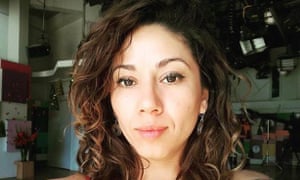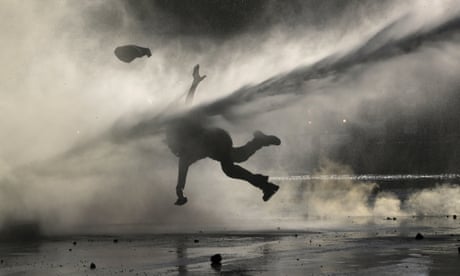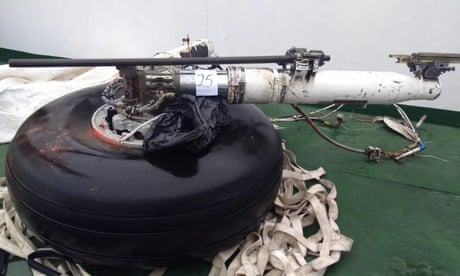Albertina Martínez found dead two days after covering a protest in Santiago amid speculation she was targeted because of her job
Charis McGowan and John Bartlett in Santiago
Tue 31 Dec 2019

Albertina Martínez, who died in November.
No arrests have yet been made over her murder.
Photograph: Supplied
Photojournalists and press freedom activists have called on authorities in Chile to investigate the murder of a young photographer amid speculation that her death may have been linked to pictures she took during violent clashes between riot police and anti-government demonstrators.

Latin America's tumultuous year turns expectations on their head
The body of Albertina Martínez was found in her apartment in the Chilean capital, Santiago on 21 November, two days after she had been seen heading to a protest nearby. She had been beaten, and a bag containing her camera, laptop and phone were missing.
“The pictures she took that day have vanished,” said her sister, Priscilla.
Sources close to the investigation say the case is being treated as a robbery with homicide, but the timing of the murder has prompted speculation that Martínez was targeted because she had been photographing the protests.
“Chilean authorities should investigate the killing of Albertina Martínez Burgos thoroughly to determine if it was linked to her reporting, and do everything possible to recover her equipment and materials,” said Natalie Southwick from the Committee to Protect Journalists.
In more than two months of mass demonstrations against social and economic inequality, thousands have been injured and at least 27 people have died.
No arrests have yet been made over Martínez’s murder, and with the motive still unclear, friends and authorities have urged caution.
FacebookTwitterPinterest Friends from Martínez’s football team have said she was afraid to attend the protests. Photograph: Supplied
Friends from her football team have said she was afraid to attend the protests, but pictures on Martínez’s private Instagram feed from the week before her death show masked protesters shrouded in billowing clouds of smoke.
Martínez moved to Santiago from southern Chile 10 years ago to pursue a career in photography, working at Chile’s main daily, El Mercurio. She then moved on to work as a lighting assistant at a television studio.
“She was clearly happier taking pictures than working at the studio, and she had a good eye for photography, but opportunities in the field can be difficult to come by,” said Sergio López, who worked alongside Martínez at the newspaper.
He had spoken to her the week before her death. “She said she enjoyed taking pictures at the protests, even though she was a little afraid,” he said.
Photojournalists group Frente Fotograficó responded to Martínez’s death by sharing her pictures of the protests, along with the hashtag #JUSTICIAPARAALBERTINA.
“We will not forget her face or her name,” they wrote.
The photojournalism collective Migrar Photo called on investigators for transparency and truth, and warned photographers to “look after one another”.
The group said that police animosity towards photographers has intensified in recent weeks, as coverage of protests has provided evidence of human rights abuses by the security forces. Members of the group have received threats from the police, and have been shot with pellets, teargas and water cannons.
Chile is considered a safe country for journalists, ranked 46th out of 180 countries in the Reporters Without Borders 2019 World Press Freedom Index.
But since the unrest began 10 weeks ago, RSF has condemned a series of attacks on the press, including forced detention.
Freelance photographer Giovanny Valenzuela was covering the same protest as Martínez on 19 November, and described a heavy police presence and “strong repression”.

Chilean air force chief says cause of Antarctic plane crash may never be known
Read more
He said news of her death and shaken other photojournalists covering the protests.
“The fact that we are in the middle of a social revolt, and a photographer was found dead without her equipment was very shocking. We feel threatened – and very sad.”
Other attacks on press include an incident in which a BBC team was apparently targeted with teargas rounds, the detention of two photojournalists, and a police assault on an Argentinian journalist who was hit in the face with a baton by officers who then destroyed her camera.
Martínez’s sister Priscilla said she had still not been contacted by prosecutors. “I can’t rule out anything because I don’t know anything,” she said.
Photojournalists and press freedom activists have called on authorities in Chile to investigate the murder of a young photographer amid speculation that her death may have been linked to pictures she took during violent clashes between riot police and anti-government demonstrators.

Latin America's tumultuous year turns expectations on their head
The body of Albertina Martínez was found in her apartment in the Chilean capital, Santiago on 21 November, two days after she had been seen heading to a protest nearby. She had been beaten, and a bag containing her camera, laptop and phone were missing.
“The pictures she took that day have vanished,” said her sister, Priscilla.
Sources close to the investigation say the case is being treated as a robbery with homicide, but the timing of the murder has prompted speculation that Martínez was targeted because she had been photographing the protests.
“Chilean authorities should investigate the killing of Albertina Martínez Burgos thoroughly to determine if it was linked to her reporting, and do everything possible to recover her equipment and materials,” said Natalie Southwick from the Committee to Protect Journalists.
In more than two months of mass demonstrations against social and economic inequality, thousands have been injured and at least 27 people have died.
No arrests have yet been made over Martínez’s murder, and with the motive still unclear, friends and authorities have urged caution.
FacebookTwitterPinterest Friends from Martínez’s football team have said she was afraid to attend the protests. Photograph: Supplied
Friends from her football team have said she was afraid to attend the protests, but pictures on Martínez’s private Instagram feed from the week before her death show masked protesters shrouded in billowing clouds of smoke.
Martínez moved to Santiago from southern Chile 10 years ago to pursue a career in photography, working at Chile’s main daily, El Mercurio. She then moved on to work as a lighting assistant at a television studio.
“She was clearly happier taking pictures than working at the studio, and she had a good eye for photography, but opportunities in the field can be difficult to come by,” said Sergio López, who worked alongside Martínez at the newspaper.
He had spoken to her the week before her death. “She said she enjoyed taking pictures at the protests, even though she was a little afraid,” he said.
Photojournalists group Frente Fotograficó responded to Martínez’s death by sharing her pictures of the protests, along with the hashtag #JUSTICIAPARAALBERTINA.
“We will not forget her face or her name,” they wrote.
The photojournalism collective Migrar Photo called on investigators for transparency and truth, and warned photographers to “look after one another”.
The group said that police animosity towards photographers has intensified in recent weeks, as coverage of protests has provided evidence of human rights abuses by the security forces. Members of the group have received threats from the police, and have been shot with pellets, teargas and water cannons.
Chile is considered a safe country for journalists, ranked 46th out of 180 countries in the Reporters Without Borders 2019 World Press Freedom Index.
But since the unrest began 10 weeks ago, RSF has condemned a series of attacks on the press, including forced detention.
Freelance photographer Giovanny Valenzuela was covering the same protest as Martínez on 19 November, and described a heavy police presence and “strong repression”.

Chilean air force chief says cause of Antarctic plane crash may never be known
Read more
He said news of her death and shaken other photojournalists covering the protests.
“The fact that we are in the middle of a social revolt, and a photographer was found dead without her equipment was very shocking. We feel threatened – and very sad.”
Other attacks on press include an incident in which a BBC team was apparently targeted with teargas rounds, the detention of two photojournalists, and a police assault on an Argentinian journalist who was hit in the face with a baton by officers who then destroyed her camera.
Martínez’s sister Priscilla said she had still not been contacted by prosecutors. “I can’t rule out anything because I don’t know anything,” she said.
---30---

